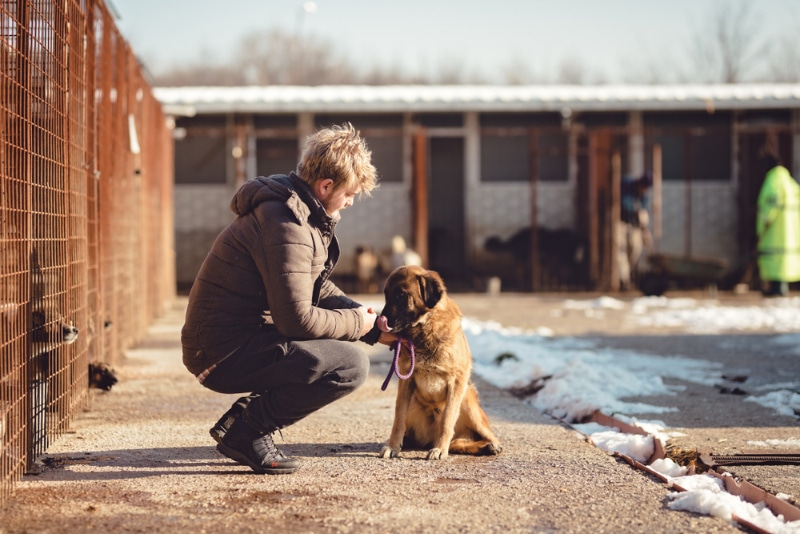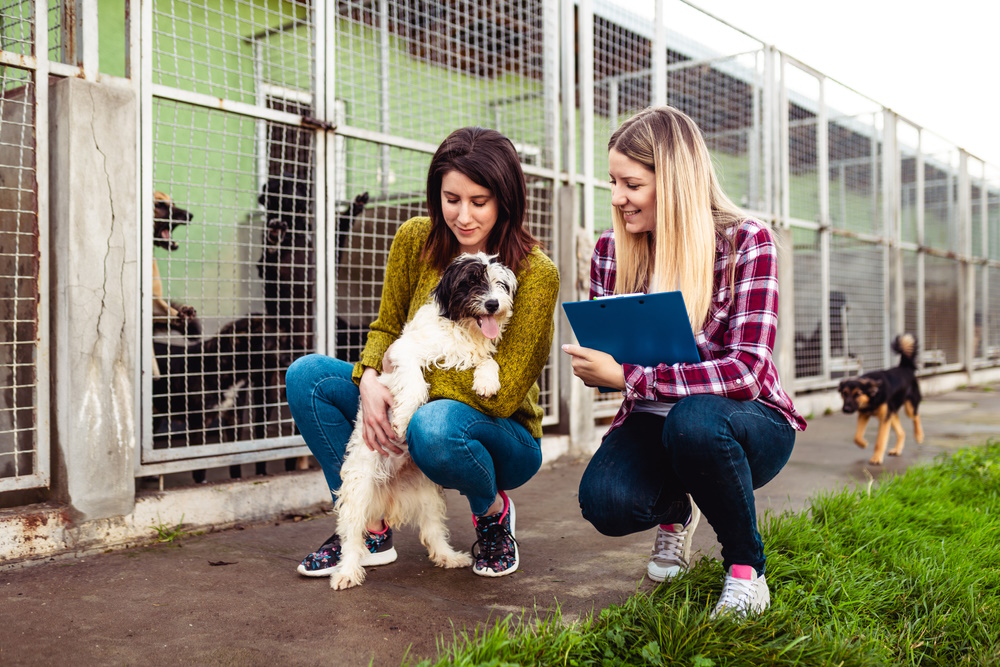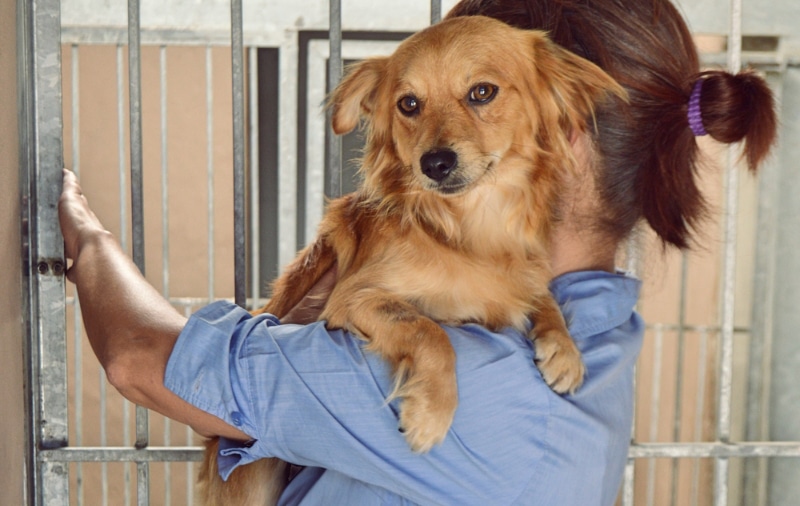It can happen to anyone. A sinking feeling, a disconnect, the realization that the dog you recently adopted from the shelter just isn’t going to work out. If you are experiencing these feelings, you are not alone. This is a common phenomenon. Not every dog is going to be a good fit in every home. When this happens, many people look into returning their dog to the shelter. This is something that anyone can do, but it might not be as simple as you think.
Here is everything you need to know about returning your dog to the shelter, including what to expect, facts and statistics, and tips for surrendering a dog.

Can You Return a Dog to the Shelter?
Yes. Anyone can return a dog to the shelter, but it might not be as easy as showing up at their door and dropping the dog off. Many shelters have rules and regulations about animal surrenders that need to be followed. There can also be some unintended consequences and side effects from returning your dog back to the shelter. Returning dogs is very common, with hundreds of thousands of instances occurring each year. If you have decided to give your dog back, there are some things that you need to know before you go.

Returning a Dog to the Shelter: What to Expect
Check the Rules
The first thing you should do before loading your dog up and bringing them back to the shelter is to check the rules. Usually, you will need to sign a surrender form which releases any ownership of the dog to the state. You will also be asked to provide a reason for the surrender and to declare any potential health issues or other relevant information.
Some other things that you might run into include a requirement of proof of ownership. (A shelter cannot accept a dog if they do not know if you are the legal owner.) Proof of ownership is usually in the form of legal ownership, according to the microchip or other papers. Some counties only allow you to surrender dogs by appointment. Some municipalities also require proof of residency.
If in doubt, speak to the shelter about your specific circumstances.
Expect Some Pushback
When you return a dog to the shelter, you might receive some pushback from the shelter. This is for a few reasons. First, the shelter’s goal is to be empty. Shelters are supposed to be a temporary measure, and finding new homes can be difficult, especially for returned dogs. Second, many of the shelter employees are deeply invested in the dogs’ welfare. They can get personally disappointed or upset when a dog comes back. Thirdly, they don’t want surrendering a dog to be an easy option; it should be a last resort when all other measures have failed. They may discuss measures that could help you to keep your dog. Remember, this is coming from a good place. Be open to advice. Lots of issues can be resolved with time and effort.

Be Honest
You are going to be asked why you are returning the dog, and you should be completely honest in your answer. If the dog has been aggressive, tell them. If the dog just wasn’t a good fit for you and your family, let them know. Honesty will help the shelter match the dog appropriately for future adoptions. For example, if the dog does not get along with kids, the shelter needs to know so that they don’t adopt the dog out to another family with kids and end up in the same situation down the line. Being honest will help the dog find their forever home, even if that home is not yours. Lying about problems with the dog or potential health issues does not help anyone.
Explore Potential Resources
Many shelters have resources available to help you surrender a dog or give you alternative options. Some shelters have dog trainers on staff that will help you train your dog to be a better fit for your family. Some shelters have teams whose whole job is to talk to you and try to find solutions for you and your family that do not include surrendering the dog to the shelter. In some cases, the shelter might ask you to foster the dog until it can be adopted again, which will let the dog stay in your home until a new family can be found.
If you are on the fence about returning your dog to the shelter or are uncomfortable with the idea, let the shelter know. They might have alternative options or resources that can help you navigate the process without having to go back to the shelter with your dog in tow.

What You Should Not Do
There are some things that you should avoid doing if you want to surrender your dog. Sometimes, a dog can be very frustrating or a bad fit for your family. That is okay, but you should not rush the process or take matters into your own hands. Look up the rules and the process and respect them. An important distinction is in cases of aggression. It is of paramount importance that the safety of yourself, your family, and the shelter staff be taken into account. Reach out for support immediately if you are concerned about safety.
Here are some things you should never do when returning a dog to the shelter.
- Don’t lie about the dog.
- Don’t ask for your money back.
- Don’t dump the dog outside of the shelter during closed hours.
- Don’t just let your dog loose and hope they’ll get picked up by the county.
- Don’t get upset or angry with the shelter if they seem to question your choice.
- Don’t get upset or angry with the shelter if they expect you to follow their rules and regulations.

Returning a Dog to the Shelter: Facts and Statistics
Fast Facts
- Number of Pets Adopted from Shelters Each Year: 4.1 million
- Number of Dogs Adopted from Shelters Each Year: 2 million
- Percentage of Pets Returned: 7%–20%
- Number of Dogs Returned: Roughly 140,000 and 400,000
How Many Dogs Are Returned to Shelters?
A study in 2020 estimates that between 7% and 20% of all animals adopted from shelters are returned within the first 6 months of their adoption.1 According to the ASPCA, roughly 4 million animals are adopted from shelters each year. That means that potentially between 280,000 and 800,000 animals are returned in the first 6 months. About half of those animals are dogs. That means that between 140,000 and 400,000 dogs are returned to shelters each year after being adopted.
Other statistics suggest that 60% of adopted pets are not in their original home after 6 months.2 This number represents people who rehome their dogs as well as returning them to the shelter. Around 20% of animals are returned to the original shelter after adoption, which is in line with the previous study. That means this is a common practice among pet owners. Up to one in five animals adopted from shelters are returned to the shelter within 6 months.

Why Are Dogs Returned to the Shelter?
There are a number of reasons that dogs are returned to the shelter. The reasons range from expenses to aggression. Here are some of the most common reasons that dogs are returned to the shelter after being adopted.
- Aggression
- Cost
- Personality incompatibility
- Health issues with the dog
- Human health issues that prevent people from properly caring for the dog
- Barking
- Poor Training
- Hyperactivity
- Destructive behavior (destroying property, digging, etc.)
Know the Potential Consequences
Before you return your dog to the shelter, you should know the potential consequences. If you are returning the dog because of aggressive behavior or severe illness, there is a chance that the dog will end up being euthanized by the shelter. This sounds drastic, but it may be deemed the right course of action to avoid potential pain and suffering. You should also consider that the dog may not find a new home. The shelter environment does not bring out the best in dogs the way a stable home does. Two thirds of adopted pets show initial behavioral issues like fear and poor response to training, but these issues appear to lessen with time spent with the new owner.

Give Pets Deep Consideration Before Adoption
One of the best ways to avoid returning a dog to the shelter is to give any new animal thorough consideration before deciding to bring them home. Some organizations, like the Animal Humane Society, allow returns in the first 60 days to make sure the dog is a good fit for you. This way, you can see how they do in your house and with your family before making a final decision.
You should also consider the costs, the lifestyle change, and the time investment that a new dog brings to your family. Do not adopt dogs on a whim. Give it some real thought and consideration. If behavioral issues are a deal breaker, consider adopting a puppy from an ethical breeder. Most shelter pets will have some initial adjustment issues. If you go in with the expectation of adopting a perfectly behaved dog, you are likely to be disappointed. If you adopt with the willingness to work on undesirable behavior, with plenty of time and patience to spare, your dog may find a lifelong home with you. If you have any doubts or hesitations, it is okay to wait until you are more ready for a dog, or you can wait for a dog that is the perfect fit for your family.

Conclusion
Returning a dog to the shelter can be a highly emotional thing to do. Dogs go back to the shelter for all sorts of reasons, and it is fairly commonplace but should not be done on a whim. Before you return your dog to the shelter, you should look up the rules, regulations, and requirements for doing so. There are usually some things that you need to be aware of before you go back to the shelter. Make sure to be aware of the requirements so you are prepared properly for the return.
See Also:
- I Gave My Dog Away & Regret It: How to Avoid This Mistake
- Is It Okay to Feed Stray Dogs? Vet-Approved Reasons & Advice
Featured Image Credit: David P Baileys, Shutterstock


















